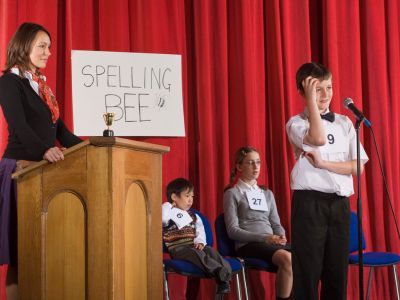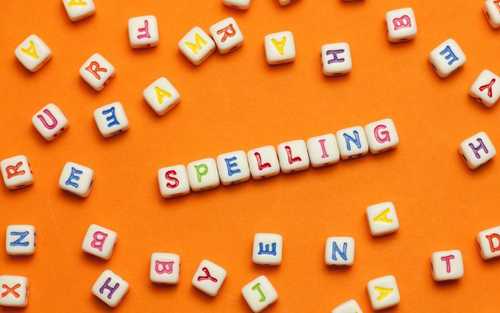9 Fantastically Fun Language Arts Games


Teaching language arts can feel like navigating a maze, but you're not alone in this adventure! One of the most effective ways to help your child fall in love with reading and writing is by incorporating language arts games into their learning routine.
Classic board games like Scrabble, Hangman, and Pictionary can be great tools, but we’ve rounded up some fresh, original language arts games for kids that will boost their reading and writing skills while making learning feel like playtime!
These are our top recommendations for language arts games that your young learner will love:
Game 1: Word Bingo
Word Bingo transforms a classic game into a vocabulary-building ELA activity for all ages. It strengthens word recognition and helps kids understand how words work in context.
How to play:
Create bingo cards filled with vocabulary words instead of numbers. Call out definitions, synonyms, or clues related to each word. Kids mark their cards accordingly. First to complete a row wins!
🎯 Learning focus: Vocabulary, context clues, parts of speech
Game 2: Storyteller's Adventure

This fantastic game sparks creativity, encourages active listening, and encourages narrative development. It also improves your child’s storytelling and comprehension skills.
How to play:
Start a story with an exciting opening sentence. Take turns adding to the plot with new characters, twists, and settings. The goal? Craft an unforgettable tale together.
🎯 Learning focus: Narrative development, comprehension
Game 3: Dictionary Detective
Dictionary Detective improves your child’s English language arts skills by promoting independent word search, reading comprehension, and sentence formation.
How to play
Give your child a dictionary and a word to find. If this is your child’s first time using a dictionary, you may need to show them how a dictionary is used. Once they locate your word, they’ll read (or listen to) the definition and use the word in a sentence. Great for vocabulary and dictionary skills!
🎯 Learning focus: Word meaning, dictionary use, sentence building
Game 4: Spelling Bee Bonanza

Spelling Bee Bonanza can transform the way your child feels about spelling, turning spelling practice into an exciting competition, boosting memory and word retention.
How to play
Write a list of words that you think your child should be able to spell - from very simple sight words, to more complex words (be sure to adjust this to your child’s grade level). Once your word list is set, challenge your child to use their spelling abilities to be crowned the family’s spelling master! Make it competitive or cooperative - either way, it builds confidence!
🎯 Learning focus: Spelling, memory, confidence
Full article: Spelling Games for Kids
Game 5: Literary Scavenger Hunt
This interactive game transforms reading into an exciting adventure, improving your child’s reading comprehension and analytical thinking at the same time!
How to play
Write a set of clues related to the book your child’s currently reading - if they’re not currently reading anything, you can use their favorite book or story. The game ends when your child guesses the title of the book or story.
🎯 Learning focus: Text analysis, memory, attention to detail
Full article: Reading Games for Kids
Game 6: Rhyme Time Challenge

This language arts game improves phonemic awareness, which is a crucial skill for early readers! Rhyme Time Challenge is a fun game that boosts your child’s phonics and rhyming skills.
How to play
Rhyme Time Challenge is a phonics game that can be played anytime, anywhere! Simply pick a word and take turns coming up with as many rhyming words as possible with or without a time limit.
🎯 Learning focus: Phonics, sound recognition, vocabulary
Game 7: Word Wall Art
Word Wall Art combines art and language arts, making vocabulary acquisition engaging and memorable, while fostering a love for words and creativity.
How to play
Create a "Word Wall" with colorful paper and markers. Each day, add a new word along with its definition and a sentence. Encourage your child to illustrate the word's meaning. This is a great learning game for all ages, as you can get your child to understand basic concepts, like when to use lowercase and uppercase, in a super fun and creative way!
🎯 Learning focus: Vocabulary acquisition, word usage, creativity
Game 8: Grammar Guardians
Grammar Guardians turns grammar practice into a more interactive and enjoyable experience for your child. Being aware of different grammatical elements within a story teaches children to recognize and use grammar rules correctly.
How to play
To play this grammar game, choose a book or story your child enjoys. While reading together, pause throughout the story and ask your child to identify specific grammar elements, like nouns, verbs, adjectives, adverbs, or punctuation marks. Give your child one point for every grammatical element they find and come up with an award system linked to these points. If you have more than one child, you can turn this game into a friendly competition!
🎯 Learning focus: Grammar recognition, punctuation, reading comprehension
Game 9: Night Zookeeper

Our language arts program for kids has been created by education experts to boost your child’s reading, writing, spelling, grammar, punctuation, and vocabulary using a gamified approach to teaching English language arts. We also offer personalized feedback on all the work submitted by children on the program to ensure steady progression.
How to play
Sign up for a free trial and get access to thousands of award-winning language arts activities, including online games (including writing, reading, and word games), interactive lessons, skill challenges, and much more!
🎯 Learning focus: Full-spectrum ELA skills with built-in fun
Got any questions? Reach out to us via email at support@nightzookeeper.com! Follow us on social media for more writing & reading games, prompts, tips, and other freebies:


Make Reading & Writing Fantastically Fun!
- Award-winning reading & writing program for kids
- Improves spelling, grammar, punctuation & vocabulary
- Over 1,000 different learning games and activities


7 Spectacular Reading Games For Kids


6 Super Spelling Games For Kids


8 Fantastically Fun Writing Games


